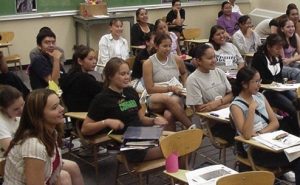Can examinations assess our intelligence?
Kiran Jonnalagadda cleared his inter college course after five attempts. And by the time he did it, his friends had completed their engineering course. For Kiran, his journey had just begun. This examination-shy boy’s name now features in the team that developed the Human Protein Reference Database by John Hopkins University. The five attempts to clear the pre university examinations did not dither Kiran’s spirit. We will find many Kirans in this mad, mad academic world.
Academic competence and intelligence are very complicated to measure the scope of a student’s aptitude. But the fact remains that we need some formal system to check the grasp of a student in a subject. We need divisions between ability levels and the amount of experience and knowledge students actually possess, otherwise students will be in environments unsuited to them and won’t be able to learn appropriately. There is no other way to divide them than by testing them in a fair and impartial manner. Exams are required from this point of view only and yes, they require clear and measurable guidelines. These guidelines must change to suit the environment. When guidelines are neither clear nor reckonable, students are deceived to believe their incapability. Do examinations test student’s innate abilities and potential? Or are we largely testing their test-taking ability, confidence and doggedness?
John Glenn, Astronaut emerged during the tense space race of the 1950s and 1960s. He was one man who represented the face of the Americans attempting to beat the Soviets into space and, ultimately, to the moon. John Glenn became a war hero and one of the most famous astronauts in history, despite being college dropout. Glenn attended Muskingum College, where he studied science, but when the Japanese bombed Pearl Harbor he dropped out in order to fight in World War II. The world never saw Glenn’s academic progress sheet.
Do we accurately test students? They answer, give information or question intelligently what they are best at and what they are happiest with through the lectures in the classroom; teachers give them feedback during and after classes. Quarterly or monthly the parents/guardians of those students will receive report cards, showing which subjects their son/daughter is best at, and which they need the most help with. It will also be noted which subject classes are that child’s favorite. Parents and students must also be able to suggest ways in which their classes could be made better, so long as the suggestions are sensible, reasonable and that they contribute to the learning environment in such a way that the students learn more and at no cost to student-teacher and student-student relationships. If some students present more information than the teacher, how many teachers would like it? And, how many students appreciate their bright peers?
Intellectual exploration is hindered due to constant efforts of students towards mastering guess work, rote learning, memorizing the so called ‘standard’ methods of answering recurring questions that were originally set to test a student’s response to untried problems.
What our examination system does is – it encourages practicing past papers in the anticipation of mastering tests and not the subject. Tests do not encourage the search of knowledge as much as the pursuit of great grades. Education should free the mind not restrict it to guidelines that are not transparent. Let us get this rightly; subjective or qualitative papers with essay questions are not as easy to measure as mathematics or other quantitative papers. It requires entirely different yardsticks to assess them.
Regular examinations result in students working toward exams and exams only. They do not work in order to learn or to seek knowledge. Students learn just to get rid of those examinations. It becomes knowledge for the sake of passing the class, receiving an A or B grade. That’s about it. Whilst coursework may easily be cheated on, it is absurd to suggest that the only other way of testing a student’s abilities and knowledge is through examination.
Debates, discussions, case studies with active class participation are one of the most effective ways of learning and retaining information. When teachers motivate students to give their opinions and views, the students gain a deeper insight into their own arguments on a topic and the class benefits from listening to these views. It also gives them a glimpse to compare their views to their peers. Through this, they can amend their own opinions or form new ones. Class participation is a necessary requirement seeing as how even if one person refuses to engage in the discussion, their own ideas are never put to the test of both the peers and their teacher, and so receive no benefit for their own beliefs, and the class also receives no benefit from that particular student. Full class participation is an absolute requirement for refining the pedagogy.
Examinations should be conducted only annually, not more than that. If there are inconsistencies between one’s examination and one’s school work, then this must be investigated thoroughly.
I often think why school dropouts do better than the regular school goers – I suppose this happens because the dropouts have no ready plan, they don’t have a degree or a guaranteed job to fall back on. So they need to push themselves harder. A dropout therefore starts earlier.
A dropout faces harsh realities; he leaps forward with fears, doubts and worries and faces life head-on. For a dropout every day is an exam. Albert Einstein the man behind E=MC2; the man who came up with the theory of relativity; and the man who won a Nobel prize—was in fact a high school dropout. He attempted to get into university, but initially failed the entrance exams.
Lastly, we give undue importance to grades and examinations though they can’t determine if someone is intelligent or not. Grades aren’t everything. If someone has scored good grades, it still could mean that the person is dumb at many other things in life. Some youngsters score low, but are good at many a things and are practical people. So either way Grades can’t determine everything. If you cheat on something for instance you get a good grade but it could still mean you’re not that smart because you cheated. School exams only test mugging up skills and competitive exams test for advanced skills which you are hardly taught anywhere. And, exam results don’t determine success in life.















































